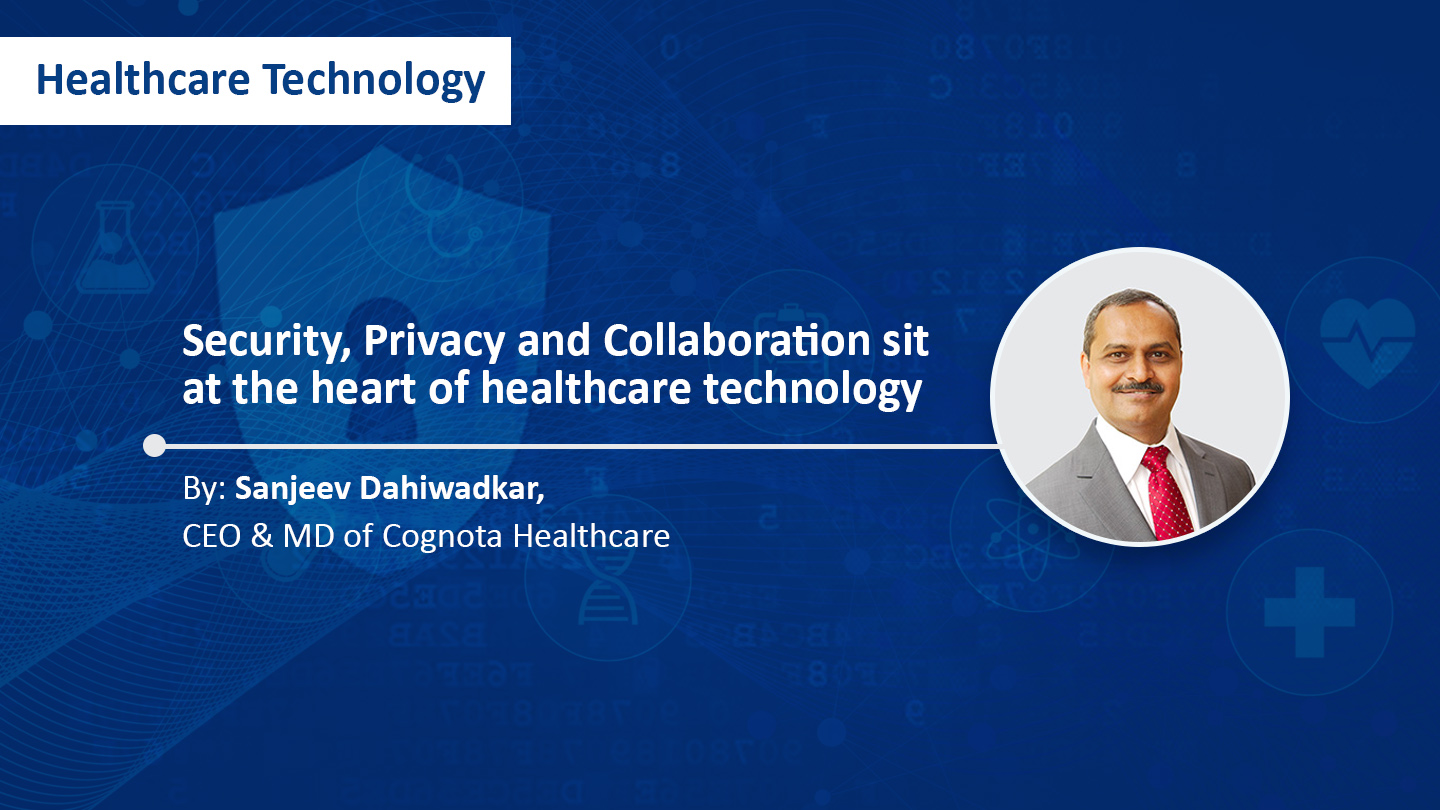
By: Sanjeev Dahiwadkar,
Managing Director @CognotaHealthcare
The world is increasingly being connected. And smart is the new buzzword. Electronic equipment, be it a smart television or a smartwatch, or a smart car; the use of software products in hardware devices is the order of the day. No wonder, healthcare technology is also witnessing a paradigm shift as more healthcare devices get embedded with software products & services such as various vitals reading sensors and biometric technology among others. Similarly, digitization of patients’ medical records has created ways for artificial intelligence (AI), machine learning (ML), internet of things (IoT), data analytics have made serious inroads into the healthcare sector in recent days. This is leading to the transformation of the healthcare sector.
The current COVID-19 pandemic is only accelerating the pace of this digital transformation. For instance, a greater number of patients are opting for teleconsultation with doctors instead of physically visiting a hospital. Similarly, Remote Patient Monitoring (RPM) is enabling healthcare staff to have a sharp eye on the vital parameters of patients from remote locations. The performance of various sophisticated radiological devices such as scans or X-Rays is being monitored from a single dashboard as these devices become connected through IoT-powered sensors. Such connectedness is leading to a multi-fold rise in productivity and efficiency in healthcare delivery. Days are not that far where one will start seeing “health-room” in luxury houses just like gym and home theatres.
However, every technological intervention comes with its own risks. As the healthcare sector adopts various emerging technologies, the possibility of cyberattacks becomes real. Cyber threats in the form of phishing attacks, ransomware, malwares are on a rise globally on various healthcare providers. Globally, the average number of weekly attacks in the healthcare sector reached 626 per week in November 2020 from 430 in October. The Global Risks Report 2021 released by the World Economic Forum (WEF) ranked cybersecurity risk as one of the top risks for enterprises in the next 10 years.
In this perspective, security, privacy, and collaboration in a cloud computing environment have emerged as the three vital pillars of the healthcare technology ecosystem. Therefore, devising a security umbrella with an integrated security approach is a must. This comprises securing each endpoint in this evolving cybersecurity threat landscape. Against this backdrop, Zero Trust security architecture is the need of the hour. Under the Zero Trust approach; everyone, whether inside or outside of the organization’s network, is assumed to be a potential threat. As a result, it relies on robust user authentication and device validation over the network to protect applications and data against emergent threats. For a healthcare service provider; a security framework, therefore, requires such validation of all staffers who handle the critical equipment and systems. Moreover, multifactor authentications with the usage of touchID or faceID-based credentials are better suited than password-based permissions. Moreover, as more patients opt for teleconsultation platforms, these collaborative tools should have inbuilt security features to protect the privacy of users. While implementing the security features, technology providers also have to take care of the ‘ease of use’ in order to see wide adoption.
We at Cognota Healthcare provide cutting-edge IT solutions to healthcare providers with advanced security features. For instance, our integrated collaborative IT platform ‘CognoHealth’ enables an enterprise to get a real-time view of doctors & hospitals, labs & ambulances, health insurance companies, diagnostics centers, pharmacies, wellness centers in one dashboard. This smart platform is embedded with security features that take care of the privacy of the users. Similar is the case for our teleconsultation platform that has built-in security features, which empower many of our partners to provide healthcare services with complete protection of patient privacy. Our IoT-powered ‘Cognota Command Center’ allows healthcare providers to conduct Remote Patient Monitoring (RPM) with real-time data generation in a secured cloud environment.
As threats of cyberattacks loom large, healthcare providers have to guard the security and privacy of their users’ data with utmost care. Imagine a situation, if thousands of patients’ data is available on the public domain without their consent or a critical healthcare device malfunction due to cyberattack, then what kind of liability that will create for the service provider. It will not only create serious reputational risk for the healthcare company, it can also be cost-prohibitive. Therefore, selecting a technology partner with the right security solutions is critical to thwarting emergent security threats.


